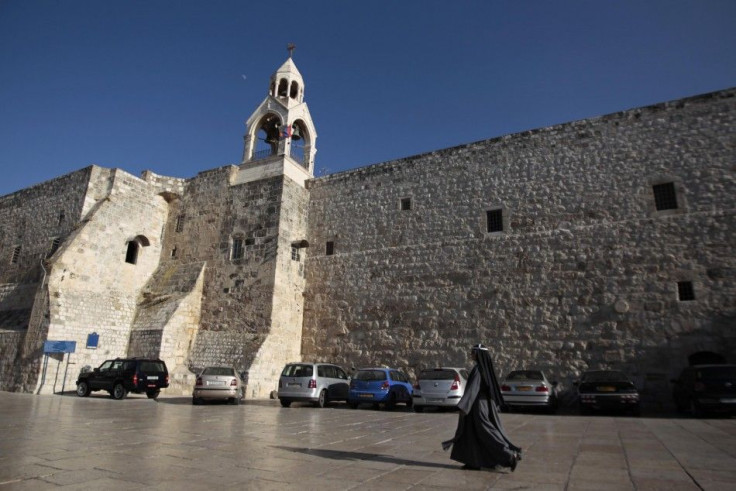Church Of The Nativity In Bethlehem: Palestinians Get Their First UNESCO World Heritage Site Amid Controversy

The Church of the Nativity in Bethlehem became the center of a heated debate this week as UNESCO's World Heritage Committee decided whether or not to include it on its renowned World Heritage List. Located in the Israeli-controlled West Bank but proposed for UNESCO consideration by Palestinians, the site received a cool response from both the UN agency and Christian religious groups, though it was eventually approved on Friday.
World Heritage Committee members from 21 states parties gathered in Saint Petersburg this week to discuss a myriad of topics including sustainable development and a new strategic plan for the next decade. Chiefly, the team assessed recommendations from the International Council on Monuments and Sites, or ICOMOS, and the International Union for Conservation of Nature, or IUCN, to select new additions to the World Heritage List.
Before this week's meetings, there were 936 sites on the list: 725 cultural, 183 natural and 28 mixed properties, in 153 nations. Currently, the committee is in the process of considering 36 sites, of which, 28 are cultural, five are natural and three are mixed. But none have received as much attention -- good or bad -- as the Palestinians' first-ever World Heritage site.
Palestine joined UNESCO and ratified the World Heritage Convention last October, when the general assembly voted 107-14 to make the Gaza Strip and the West Bank collectively the organization's 195th member. It was the first such vote by a part of the world body and subsequently, the United States, Israel's staunch ally, cut all UNESCO funding, depriving the organization of 22 percent of its revenues.
The United States contributes 1 percent of its total contribution to the World Heritage Fund, so some activities that would have been funded from that support will have to be cut back or postponed, or we will have to look for alternative funding. That is how we are trying to meet this challenge, Kishore Rao, director of UNESCO's World Heritage Center, told IBTimes last week.
The Palestinians aren't shy about the political component of their bid, saying UNESCO recognition of the ancient basilica -- built over Jesus' traditional birth area in the biblical town -- is a vote for an independent Palestine. Israelis say that assertions that their country's occupation of the West Bank threatens one of Christianity's holiest sites are simply untrue.
Palestinian President Mahmoud Abbas hopes to win World Heritage recognition for 20 sites, and he tapped the Church of the Nativity and the ancient pilgrimage route leading to it as the most likely to gain such recognition due to its emotional appeal to millions of Christians. He also hopes UNESCO status will help Palestinians gain better control over tourism to the site. Because Israel controls the borders and restricts movement in the region, Bethlehem's many tourists are limited to short daytime visits, having to return to their Jerusalem hotels in the evening, thus depriving Palestinian hoteliers and restaurateurs from reaping the full benefits of the site.
The Palestinian delegation to UNESCO submitted the site on an emergency basis, claiming it was in imminent danger, but a panel of UNESCO-designated experts determined that, although the church needs conservation, there is no immediate threat of collapse. Therefore, they argued, it did not qualify for emergency status (a shortcut of sorts) and should be deferred to next year.
Leaders of the three denominations that share the administration of the church -- Armenian Apostolic, Greek Orthodox and Roman Catholic -- also declined their support.
In our opinion, we do not think it opportune to deal with this request that the basilica and its entire complex be included in the list of World Heritage sites, due to different considerations, they said in a letter to the Palestinian president.
In response to growing criticism, Elias Sanbar, the Palestinian ambassador to UNESCO, wrote a letter criticizing what he called a persistent campaign of rumors aimed at discrediting Bethlehem's candidacy by those who do not want to see Palestine exercise its legitimate rights.
He claimed that the U.S. was coercing members of the committee to vote it down.
Nevertheless, the site was passed by a vote of 13-6 Friday. Two nations abstained. The Church of Nativity was immediately added to the list of World Heritage [sites] in Danger.
The row over a Palestinian World Heritage site is hardly the first controversy to strike UNESCO or the first time it has been at odds with the United States.
UNESCO's support during the 1970s and 1980s for a New World Information and Communication Order and its MacBride report, which called for the democratization of the media, was perceived by some as a soap box for Third World dictators to attack the West and an attempt to curb freedom of the press. Consequently, the United States, United Kingdom, and Singapore all withdrew from the organization in protest. The United States did not rejoin UNESCO until 2003.
UNESCO also came under fire last year when a Palestinian magazine funded by the organization ran a story written by a teenage girl that suggested admiration for Adolf Hitler. In the article, Hitler tells the author that he killed Jews so you would all know that they are a nation which spreads destruction all over the world.
UNESCO called the magazine content unacceptable and subsequently cut all funding and support.
© Copyright IBTimes 2024. All rights reserved.






















